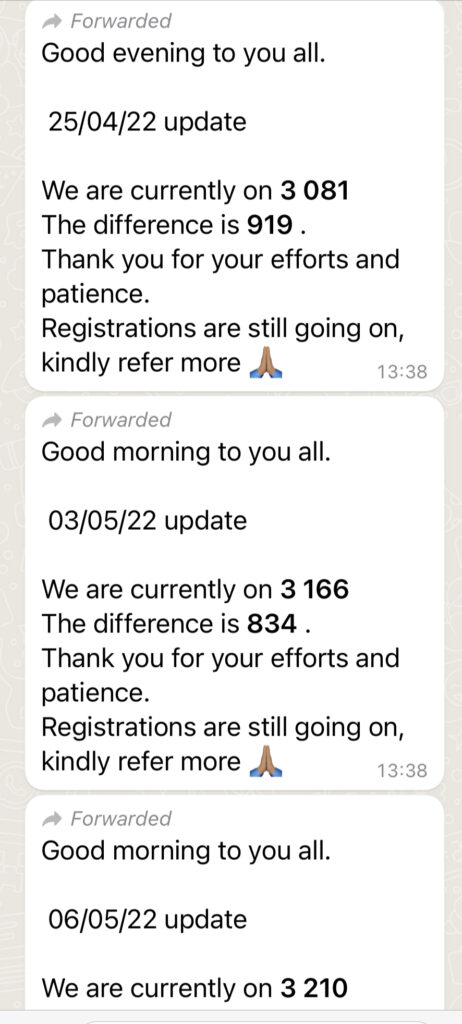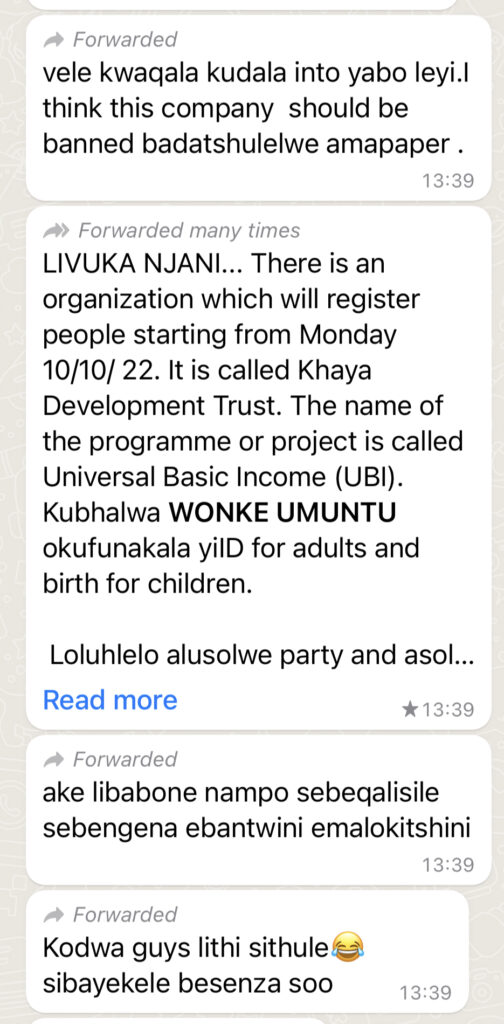Source: NGO accused of cashing in on desperate residents – #Asakhe – CITE

Thousands of people in and around Bulawayo fear they may have been duped by a local Non-Governmental Organisation (NGO) consortium that goes around communities luring participants by promising them jobs, food vouchers, and monthly relief funds if they part with a small registration fee.
People from various areas at different times paid money ranging from US$1 to US$10, R20 to R30, ZWL$130 and ZWL$150 to be part of this programme run by a consortium made up of Khanya Development Trust, Pot-On Investments, Misinzo Enterprise and the Bulawayo Disabled People Association.
Participants heard from other ‘excited’ individuals that the consortium was looking for people to work as customer services representatives, agents, field officers and supervisors, dating three years ago.
They were also informed they would receive monthly handouts of US$160 from its Universal Basic Income scheme, for the next three years.
Those who expressed an interest would be added to WhatsApp groups for a registration procedure in which they would be encouraged to invite more participants.
Participants were told to bring their identity documentation and proof of residence to Khanya Development Trust offices situated at Astra Complex in Bulawayo for registration.
The money they paid was said to be for processing ATM cards where their monthly stipend would be deposited.
Participants allege the consortium has ‘easily’ made over ten thousand US dollars from ‘needy’ people seeking to gain work and grants in an alleged elaborate scam that also exposes people’s desperation created by Zimbabwe’s severe socio-economic situation.


During the Covid-19 era, participants claimed they were told the organisation would distribute food aid for three years.
Others claimed the organisation presented agreements signed with Angel of Hope, a foundation run by the First Lady, Auxilia Mnangagwa to assist the vulnerable.
One of the victims, Mbongeni Moyo, based in Plumtree, said a friend informed him about this programme.
“I joined with my friend and his wife. The joining fee was US$10. They were looking for more people, especially from rural areas to join. I however didn’t look for other people as I had my suspicions,” he said.
“We filled our forms at Khanya offices and were told we must have Telecel sim cards in order to be given Telecel bank cards where the money would be deposited.”
When nothing materialised, Moyo said some participants made follow-ups on WhatsApp but the organisation changed group settings allowing only administrators to post.
“That was the end of the story. This was one and a half years ago,” he said.
“I did not report to the police, as I told myself it was a pyramid scheme.”
Another victim who preferred anonymity said he joined in March this year and paid US$10 including money pegged in local currency.
“I know people paid different amounts, some paid R20. We were added to WhatsApp groups and informed 4 000 people were needed for the project to start. People were supposed to receive vouchers to buy groceries from shops and others would receive monthly salaries but nothing came,” he said.
When inquiries were made, participants were told: “they were waiting for approval from the Office of the President. They went quiet and at the end of the day people have lost,” said the victim.
Metrone Moyo joined on March 2 this year after seeing an advert post searching for representatives and agents to facilitate grants for self-development projects.
“I paid US$8, R15 and another amount in local currency. The money was for opening nostro accounts. The project was said to be nationwide as we would be deployed to different parts,” she said, adding she forwarded that advert to her friends.
“We were told the project will start at the end of March where we would sign contracts but that never came. There was excuse after excuse. We were told 4 000 beneficiaries are required. We were already acting as if we were employed and encouraged to invite more.”
Moyo claimed the organisation told them they would be backdated for March and be paid for the next month.
“When we finally reached 4 000, we were told to be patient then it became story after story. Three weeks ago, we heard the NGO was now moving in the western areas. They have assigned people to register others at their own expense claiming they would be reimbursed later. I guess this was a scam,” she said.
“I never really thought of reporting to police considering the fact that it might be taxing to have to constantly report to the police if ever they need clues or information for their investigation.”
Reached for comment, Angel Netha who runs Khanya Development Trust said their programmes were “genuine and legit and ethical” but no one had befitted yet, as the programme was still under “trial and error.”
“This NGO was registered in 2003 and has been here for more than 20 years. People have even complained to our landlord about this programme but we have nothing to hide. Go to the CID department (police) commissioner they have our documents and know about the programme,” she said.
Her staffer, Prudence Ntabeni, explained that Khanya was under a consortium, working with three other organisations to implement the project.
“Each organisation was supposed to register 1 000 project beneficiaries to improve the livelihood of Zimbabweans. Currently, we are doing a baseline survey in communities. When you work as a consortium there are processes and delays, especially in a new programme,” she said.
Ntabeni said the registration money from participants was for administration costs involved in opening bank accounts.
“Beneficiaries will receive US$160 every month for the next three years from the donor who said they can’t pay for bank cards and administration. There is something called ‘own contribution’, the donor will say I’m giving you $100 000 but you have to raise a certain amount to cover administration costs,” she said.
Netha added that as part of a consortium, Khanya Development Trust was not the only organisation registering people.
“This project started in 2019 and stopped during Covid-19. It resumed last year. There was a challenge with bank cards and vouchers. There were security issues with vouchers in supermarkets, issues to do with buying from different shops and getting change if they didn’t exhaust money in the cards. People were supposed to use bank cards first, then we had vouchers and went back to cards but something is not going right. It’s been trial and error until we get it right. There’s communication between us and the Reserve Bank of Zimbabwe about that. No one has benefitted yet but everyone is still going to benefit after we find a solution.”
The NGO’s staff acknowledged their communication was poor as they were advised not to engage on social media, which could be manipulated but invited people to their office.
“Structures of WhatsApp groups would be addressed in meetings but some don’t attend meetings. People must learn to come and get information from the office. We won’t have the capacity to respond to every person on social media because someone will want to provoke you,” said the staff, noting if their programmes were a scam, they would have been arrested.
“We had exercises in different wards, if this was not straight, why do we operate from community halls? Who gave us permission to operate there or at shopping centres, why haven’t we been arrested? Why is this office functional? We have been here since 2019.”
One of the consortium members – Maureen Chitovo of Pot-On Investments corroborated Khanya Development Trust’s submissions, saying the programme has been running for three years but has not been implemented.
“We were doing paperwork and that succeeded on July 18, 2022. As a consortium, we have a mother body VISTRA Capital and our donor is Universal Basic Income (UBI). Participants now pay US$1 and pay the US$7 balance on the day they collect the bank card,” she said, citing the donor has not raised funds for administration costs.
“For the database, that’s why we take pictures of people alongside their ID.”
Chitovo admitted the NGOs had some hiccups and failed to handle some logistics well while “running to meet targets.”
“We don’t blame people if they were complaining but we are now correcting everything. On that one, people will get clarity, we are now doing damage control. There was a recording that was played at a radio station saying this is a scam. We are correcting this. A programme will be played on Thursday on Radio Zimbabwe. We admit we had challenges here and there,” she said.
“Starting from Friday everyone who will register will find an agent with their tag labelled VISTRA Capital stating their position number and when paying their dollar, will be given a stamped receipt showing the company they registered under. This is genuine and not a scam.”
